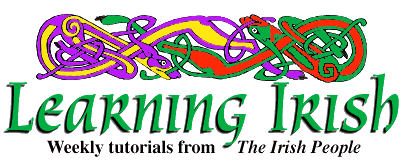
Irish Lesson 32
|
PRONUNCIATION In Irish, as in English, some of the sounds or syllables in words are dropped out in rapid everyday speech. You must learn to do this yourself and to listen for it in the speech of others. Up to now, these lessons have given you largely the full pronunciation of individual words, even in sentences. We will now begin to indicate how sentences are pronounced in everyday speech. Individual words in vocabularies and examples will still receive their full pronunciations, however. You should learn them thoroughly before using the words in a sentence. Here are examples of word-group pronunciations: Tá a fhios agat (TAW* uh is uh-GUHT) you know, becomes (taw*s uh-GUHT), with the sound for ³a² elided. Fear an tí (far un TEE) man of the house, becomes (far uh TEE). Ban an tí (ban un TEE) woman of the house, becomes (ban uh TEE). Cá bhfuil tú ag dul? (KAW* vwil too uh DUHL) Where are you going? can become (KAW*-il too uh DUHL). Tá an fear anseo (taw* un FAR un-SHUH), The man is here, becomes (taw*n FAR-un-SHUH). We will put this into lessons gradually enough so that you will not become confused. And remember that everyone learning a language with the help of a book tries to sound all the letters in all the words, but native speakers never do.
GRAMMAR Another use for ³le², with, is in expressions like: Tá cara liom ansin (taw* KAH-ruh luhm un-SHIN), a friend of mine is there. Leabhar liom (LOU-wuhr luhm), means ³a book of mine². Hata le Seán: one of John¹s hats. Clog le Nóra: one of Nora¹s clocks, or a clock of Nora¹s. This usage implies that the subject spoken of is only one of several in its class. ³Leabhar liom² implies that I have several books. ³Mo leabhar² is ³my book² and does not say whether I have others.
REFLEX EXPRESSIONS Is dócha é (is DOHK*-uh ay*) It¹s likely, I suppose so. Maith go leor (mah goh lohr) good enough. Cibé ar bith (KI-bay* er BI) anyway. Anois agus arís (uh-NISH AH-guhs uh-REESH) now and again, now and then.
VOCABULARY Masculine Noun pá (paw*), pay
Feminine Nouns obair, an obair (OH-bir, un OH-bir), work, the work
freagair, ag freagairt (FRAG-ir, uh FRAG-irt) answer d¹fhreagair mé, d¹fhreagraíomar (DRAG-ir may*, drag-REE-uh-muhr), I answered, we answered caill, ag cailleadh (keyel, uh KEYEL-uh), lose tiomáin, ag tiomáint (ti-MAW*-in, uh ti-MAW*NT), drive séan, ag séanadh (shay*n, uh SHAY*N-uh), deny tuill, ag tuilleamh (till, uh TILL-uhv), earn ag déanamh na hoibre (uh DAY*N-uhv nuh HIB-re), doing the work póg, ag pógadh (pohg, uh POHG-uh), kiss croch, ag crochadh (krohk*, uh KROHK*-uh), hang gearán, ag gearán (gyar-AW*N, uh gyar-AW*N), complain tochail, ag tochailt (TOHK*-il, uh TOHK-ilt), dig thochlaíomar (hohk*-LEE-uh-muhr), we dug NOTE: Tá an cóta ar crochadh (the coat is hanging); not ³ag crochadh², because the latter would mean that the coat is actively hanging something or someone.
DRILL Go through a progressive drill beginning with the forms: An leabhar liom é seo? Is this a book of mine? Ní leabhar liom é seo. Is leabhar leat é seo. Continue with ³An leabhar leat é seo? Ní leabhar leat é seo.² Etc. The last sentence will be: ³Is leabhar liom é seo.² Repeat this with ³le Seán, le Máire, le dochtúir, leis an bhfear, leis an mbean, leis an gcailín².
CONVERSATION EXERCISE Read what Bríd says each time, and follow the instructions for what you are to say. Say something appropriate in Irish before you glance down at the key, which you should cover until you need a line. Bríd: Dia duit, a Dhónaill. Tú: (Answer her and ask her how she is.) Bríd: Tá mé go han-mhaith (HAHN-un-VWAH), agus conas tá tú féin? Tú: (Tell her that you are well, too. Ask her where Pascal is.) Bríd: O, bhí sé ag obair sa ghairdín an lá go léir, ag tochailt. Tú: He earned his pay, I suppose. Is he still doing the work? Bríd: Tá sé ag obair fós, agus a chóta ar crochadh ar an mballa in aice leis (in AK-e lesh) (meaning ³near him²). Tú: He didn¹t complain yesterday, and the weather as hot as it was. He came home directly. Bríd: Níor chaill sé rud ar bith, bheith ag obair amuigh. Tú: We dug in the garden yesterday. Long work it is. Bríd: Is fíor duit. Níor shéan mé riamh é sin. (I never denied that.) Tú: Tell her you like to be working outside.
Key: Dia¹s Muire duit, a Bhríd. Conas tá tú? Tá mé go maith, leis. Cá bhfuil Pascal, cibé ar bith? Thuill sé a phá (faw*), is dócha. An bfuill sé ag déanamh na hoibre fós? Níor ghearán sé inné, agus an aimsir chomh (hoh) te agus a bhí sé. Tháinig sé abhaile go díreach. Thochlaíomar sa ghairdín inné. Obair fhada is ea í. Is maith liom bheith ag obair amuigh.
(c) 1997 The Irish People. May be reprinted with credit. |